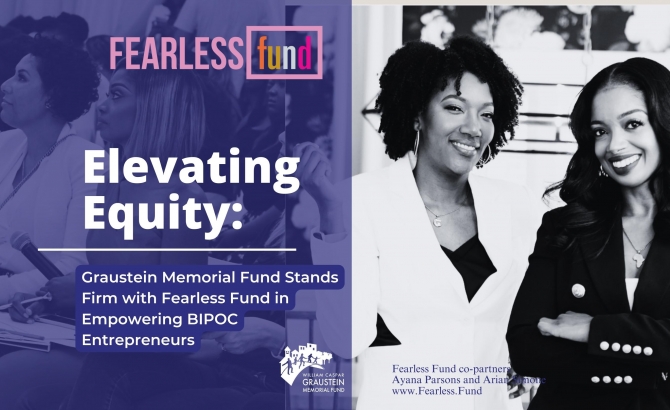Elevating Equity: Graustein Memorial Fund Encourages Continued Investment in Diverse Fund Managers like Fearless Fund.
The Graustein Memorial Fund stands in solidarity with The Fearless Fund and its commitment to ensure opportunity and financial resources for BIPOC entrepreneurs.
As anticipated, the June 29th Supreme Court Decision (SFAA vs Harvard and UNC) overturning affirmative action in higher education is part of a larger strategy to dismiss the role structural bias and resource gaps play in preventing progress for BIPOC communities.
This month, the plaintiffs in the Supreme Court decision, The American Alliance for Equal Rights (AAER), filed suit against The Fearless Fund, a BIPOC fund manager focusing on women entrepreneurs – arguing that their partnership with Mastercard providing grants to Black women entrepreneurs is racially discriminatory.
In fact, racial bias in the financial industry in general, and the venture capital space in particular, is deeply discouraging. in 2022, less than 2 percent of the $70 trillion wealth management industry was controlled by women and people of color, with a mere 0.34 percent going to Black women. Additionally, due to the historic racial wealth gap, talented Black women entrepreneurs do not have access to the “friends and family” start-up capital available to their white male counterparts.
Particularly pernicious is the implicit, widespread belief that women and/or BIPoC fund managers and entrepreneurs are less qualified than their male, white counterparts. On the contrary, data shows that funds led by BIPoC males outperform upwards of 40 percent over funds led by white males. Indeed, BIPOC- and women-led funds are more likely to outperform expectations because of a commitment to find and invest in overlooked and undervalued companies – companies who in turn are often helmed by women and BIPOC leaders who suffer not from low business acumen, but rather lack of capital.
Per a 2018 report by Harvard Business Review, The Other Diversity Dividend: “...projects selected by both homogeneous and diverse sets of investment partners were equally promising at the time the decision to invest was made. Differences in decision quality and performance came later, when the investors helped shape strategy, recruitment, and other efforts critical to a young company’s survival and growth. Thriving in a highly uncertain competitive environment requires creative thinking in those areas, and the diverse collaborators were better equipped to deliver it.”
With clear data on the outsized financial returns delivered by diverse fund managers, diversifying investments would seem an ideal approach. Pervasive selection bias prevents this logical pivot however, with mostly white male LPs and investment committees tending to invest in fund managers who look like themselves – white males. These funds in turn invest in entrepreneurs/founders who look like themselves – white males. And the cycle of race- and sex-based exclusion continues.
It is clear that inequality in venture capital investment is not an issue of talent, but of historic, persistent structural funding disparities that hit deepest at the intersection of race and gender. In 2018, the Graustein Memorial Fund created our Investment Policy as a framework for structuring our endowment intentionally to disrupt these institutional inequities. Previously run almost entirely by white males, our own portfolio is now 79 percent run by women and people of color.
In addition to delivering strong performance even in the latest economic downturn, this diversification will spur increased capital flow into BIPOC- and women-led endeavors. We hope it will also encourage dialogue and self-assessment across the industry – among peer LPs, endowments and foundations, investment consultants, and other fund managers. We are committed to this same ongoing self-assessment.
We invite our peers with influence over capital allocation decisions to stand with us in supporting Fearless Fund and others likely to face similar attacks. And to continue to explore the power and limitations of your own funding practices. The goal of true equality asks nothing less from each of us.
 William Caspar Graustein Memorial Fund
William Caspar Graustein Memorial Fund
